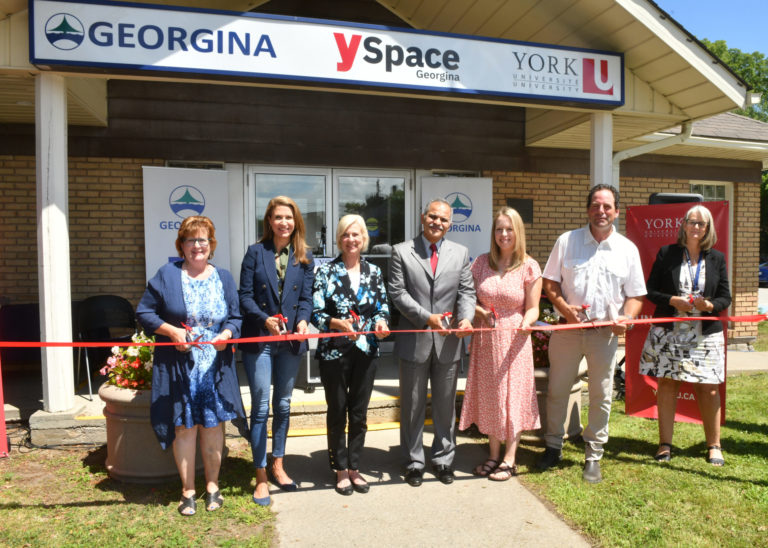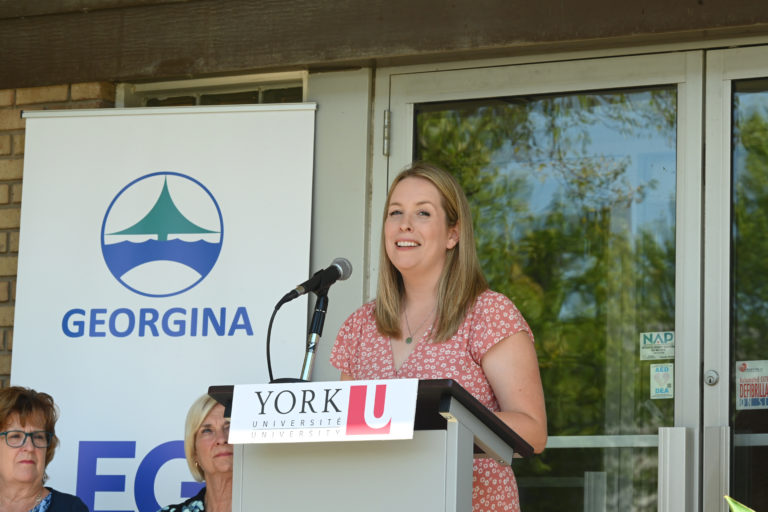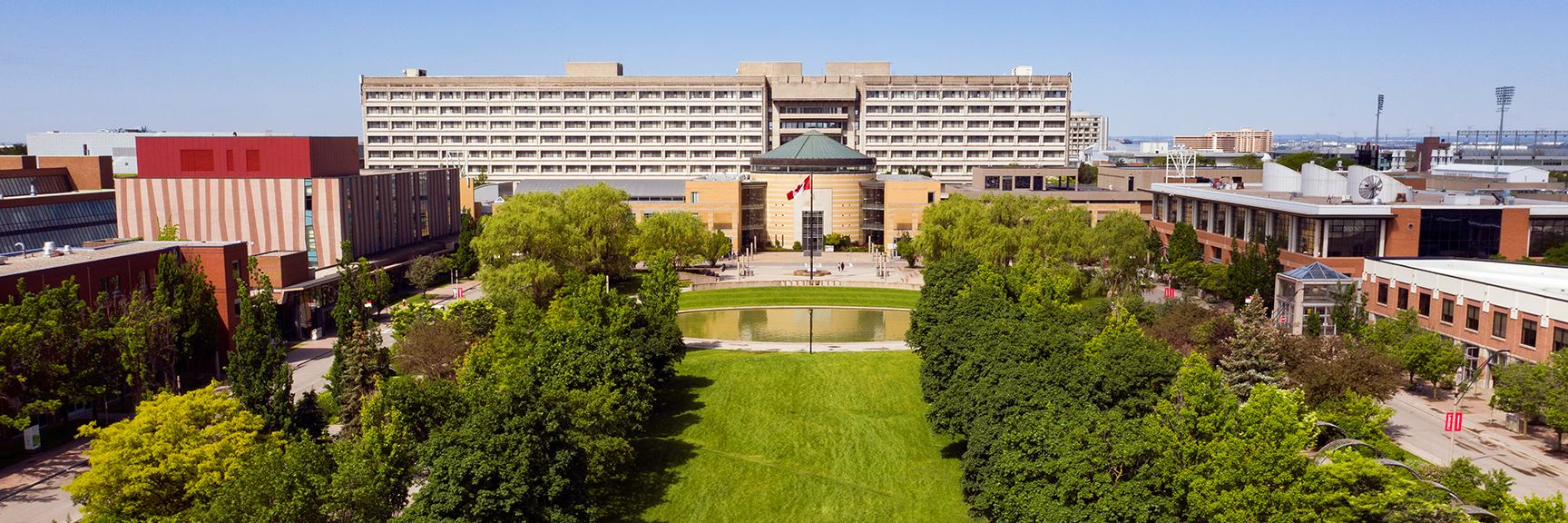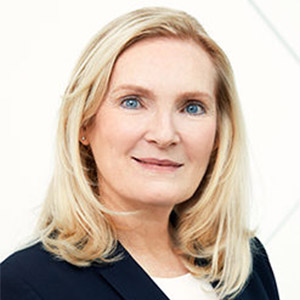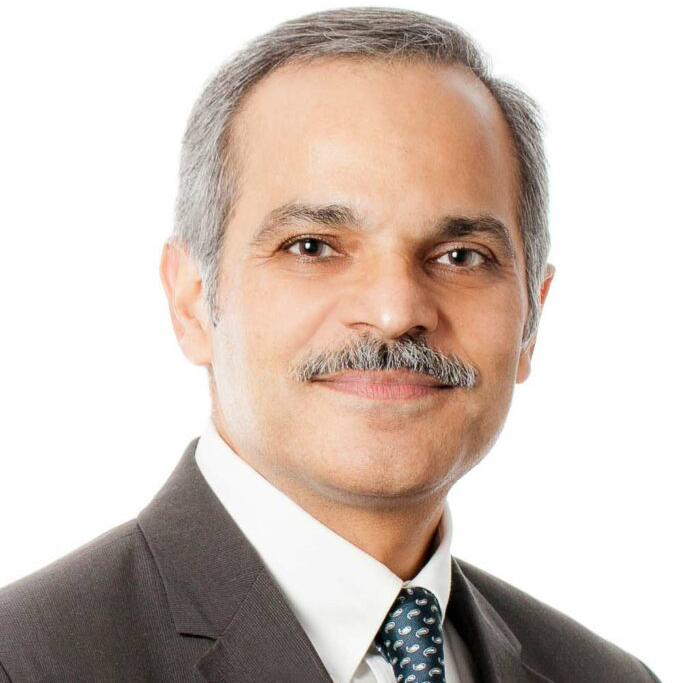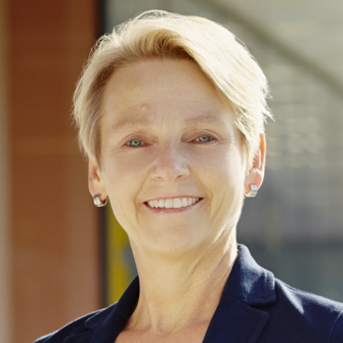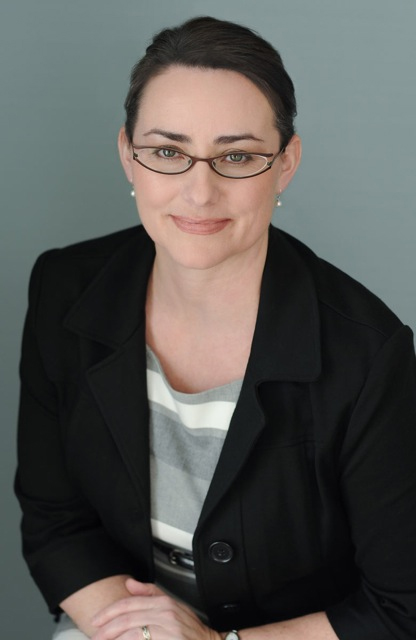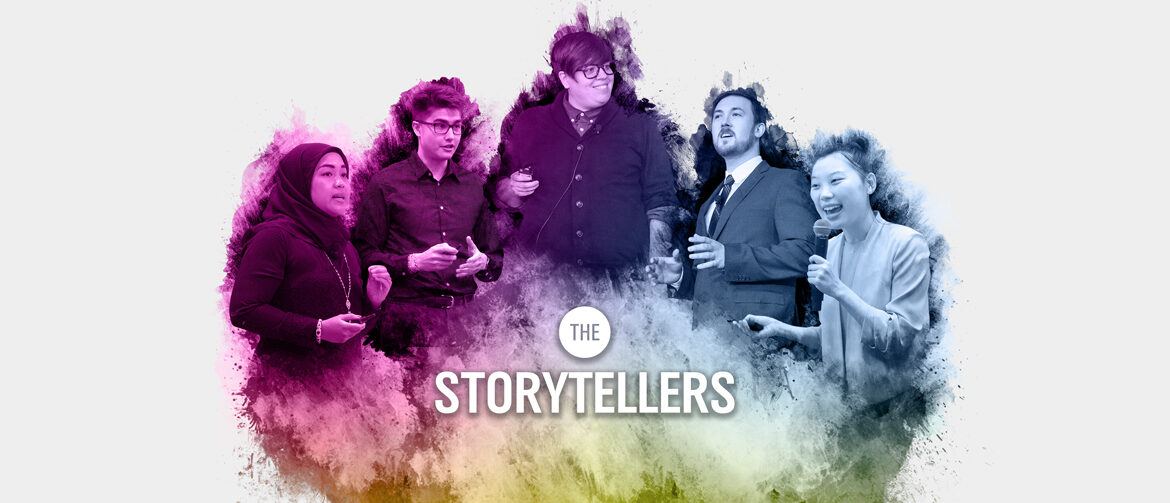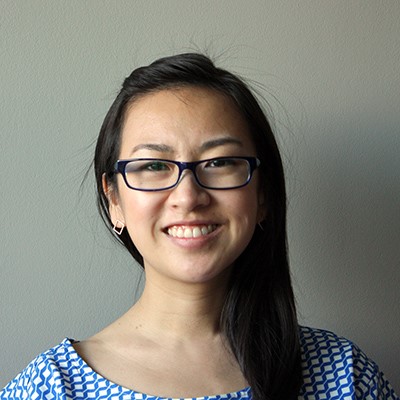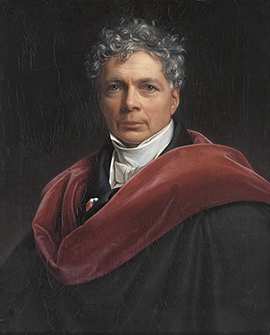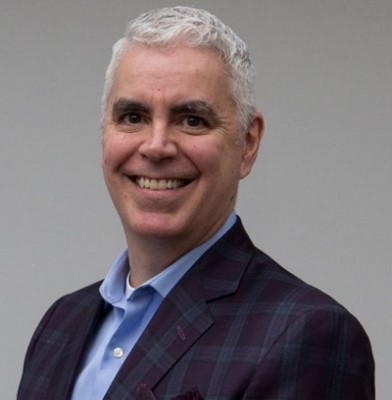La version française suit la version anglaise.
Dear York community members,
Our society has benefited immensely from Indigenous knowledge, languages and ways of knowing and being. Indigenous people contribute to positive change in our communities, our environment and to the enrichment and well-being of society.
Indigenous scholars and students have made and continue to achieve tremendous success in research, teaching and learning, despite ongoing barriers rooted in deep colonial policies and practices that govern research administration and in many ways conflict with Indigenous research methodologies. York acknowledges the implications of the lack of attention and recognition that was given to the legitimacy of Indigenous knowledge in the past.
York is committed to supporting emerging and established Indigenous scholars and the knowledge creation they are involved with, in collaboration with the community, knowledge keepers and elders. This commitment has been and continues to be an ongoing journey. York was the first Canadian university where a dissertation was written and defended in an Indigenous language. We are committed to putting in the work to support and recognize the legitimacy of Indigenous knowledge and the value that Indigenous scholars contribute. We recognize the significance of Indigenous languages and the knowledge embedded in language.
In November 2017, York launched the Indigenous Framework, which identified 10 principles the University needed to take action on to advance the goals of the Truth and Reconciliation Commission. Guided by the Framework, and working in consultation with the Indigenous Council, the Office of the Vice-President Research & Innovation developed a Decolonizing Research Administration Report to address the University’s research administration practices and policies, and to identify further steps the University should take to better support and foster Indigenous scholars.
The University has taken positive steps in this journey to date.
- In May 2018, York launched its Strategic Research Plan 2018–2023: Towards New Heights, which identified Indigenous futurities as an opportunity to advance social, cultural, artistic, legal, policy, economic and justice areas that holistically shape Indigenous experience. York remains committed to building community partnerships in research, and to facilitating research that is relevant to Indigenous life and respects Indigenous approaches to knowledge and learning.
- In June 2020, York launched the University Academic Plan 2020–2025: Building a Better Future, which affirmed its commitment to the Indigenous Framework and identified six priorities for action for building a better future, including stronger relationships with Indigenous communities.
- In July 2021, York announced the appointment of Professor Susan D. Dion to the inaugural role of associate vice-president Indigenous initiatives. Professor Dion is a Lenape and Potawatomi scholar with mixed Irish and French ancestry and was the first Indigenous tenure-track faculty member to be hired by the Faculty of Education at York. Professor Dion’s work has been instrumental to the implementation of York’s Indigenous Framework and the Decolonization Research Administration Report.
- In September 2021, York launched the Centre for Indigenous Knowledges and Languages – the first organized research unit of its kind at York – which is committed to Indigenous approaches for the environment, education, languages and decolonizing research. The Centre for Indigenous Knowledges and Languages is led by inaugural Director Deborah McGregor, an associate professor at York and the Canada Research Chair in Indigenous Environmental Justice at Osgoode Hall Law School.
- In December 2021, the Office of the Vice-President Research & Innovation awarded $525,000 to two projects focused on advancing Indigenous futurities through the Catalyzing Interdisciplinary Research Clusters. The projects include “Indigenous Climate Leadership and Self-Determined Futures,” led by Deborah McGregor, Osgoode Hall Law School and Angele Alook, Liberal Arts & Professional Studies, and “From Colonial Genocide to Just Relationships: Building Interdisciplinary Research Excellence for Indigenous Futurities,” led by Luann Good Gingrich, Liberal Arts & Professional Studies, and Heidi Matthews, Osgoode Hall Law School.
- In the Winter 2023 term, the Office of the Vice-President Research & Innovation will launch the first wholly autonomous Indigenous Research Ethics Board, which will be led and advised by Indigenous members, with the goal of providing oversight and ethics review into research involving Indigenous Peoples.
We would like to commend the Indigenous Council, the Office of the Vice-President Research & Innovation and the Division of Equity, People and Culture for their progress to date, and for their unwavering commitment to supporting Indigenous research and the work of Indigenous scholars.
The University is fully committed to taking action to decolonize research, and to recognizing and supporting research in service of the sovereignty and self-determination goals of Indigenous people, now and in the future. We will foster and promote scholarly activity relevant to Indigenous life, while respecting Indigenous approaches to knowledge and learning. By doing so, we will live our values by championing diversity and by creating a supportive, inclusive and caring environment for all.
The decolonization of research is not a short-term goal and there is still a great distance to go, but York is committed to putting in the work. We will continue to consult and collaborate with Indigenous scholars and students to build spaces and places for Indigenous knowledges and languages.
Sincerely,
Rhonda Lenton
President and Vice-Chancellor
Amir Asif
Vice-President, Research & Innovation
Sheila Cote-Meek, PhD
Vice-President, Equity, People & Culture
Déclaration sur l’engagement de York envers le Cadre stratégique autochtone et la décolonisation de la recherche
Chers membres de la communauté de York,
Notre société a énormément bénéficié des savoirs, des langues et des modes de connaissance et de vie autochtones. Les peuples autochtones contribuent à un changement positif dans nos communautés, notre environnement et à l’enrichissement et au bien-être de la société.
Les membres autochtones de la communauté de recherche et de la communauté étudiante ont obtenu et continuent d’obtenir d’immenses succès dans les domaines de la recherche, de l’enseignement et de l’apprentissage. Ils y parviennent malgré des obstacles permanents qui trouvent leur origine dans les politiques et pratiques coloniales profondément ancrées qui régissent l’administration de la recherche et qui, à bien des égards, entrent en conflit avec les méthodologies de recherche autochtones. York reconnaît les implications du manque de sensibilisation et de considération accordé à la légitimité des connaissances autochtones dans le passé.
York s’engage à soutenir les chercheuses et chercheurs autochtones émergents et établis ainsi que la création de connaissances à laquelle ils et elles participent, en collaboration avec la communauté, avec les Gardiens du savoir et avec les Aînés. Cet engagement était et demeure un cheminement permanent. York a été la première université canadienne où une thèse a été rédigée et soutenue dans une langue autochtone. Nous nous engageons à faire le nécessaire pour appuyer et pour reconnaître la légitimité des connaissances autochtones et la valeur de la contribution des chercheurs autochtones. Nous reconnaissons l’importance des langues autochtones et des savoirs qu’elles véhiculent.
En novembre 2017, York a lancé le Cadre stratégique autochtone, qui identifiait dix principes que l’Université devait mettre en œuvre pour faire avancer les objectifs de la Commission de vérité et de réconciliation. S’inspirant de ce cadre et en consultation avec le Conseil autochtone, le Bureau du vice-président de la recherche et de l’innovation a élaboré un Rapport sur la décolonisation de l’administration de la recherche afin d’examiner les pratiques et les politiques de l’Université en matière d’administration de la recherche et de déterminer les mesures supplémentaires que l’Université devrait adopter pour mieux soutenir et encourager les chercheurs autochtones.
À ce jour, l’Université a pris des mesures positives dans ce sens :
- En mai 2018, York a lancé son Strategic Research Plan 2018-2023 : Towards New Heights, qui considère les futurs autochtones comme une occasion de faire progresser les domaines sociaux, culturels, artistiques, juridiques, politiques, économiques et judiciaires qui façonnent l’expérience autochtone de manière holistique. L’Université York reste déterminée à établir des partenariats communautaires dans le domaine de la recherche et à faciliter les recherches pertinentes à la vie des Autochtones et qui respectent les approches autochtones en matière de connaissances et d’apprentissage.
- En juin 2020, York a lancé le Plan académique de l’Université 2020-2025 : Bâtir un avenir meilleur dans lequel elle affirme son engagement envers le cadre autochtone et définit six priorités d’action en vue d’un avenir meilleur, notamment le renforcement des relations avec les communautés autochtones.
- En juillet 2021, York a annoncé la nomination de la professeure Susan D. Dion au poste inaugural de vice-présidente associée aux affaires autochtones. La professeure Dion est une érudite Lenape et Potawatomi d’ascendance irlandaise et française. Elle est la première professeure autochtone engagée par la Faculté d’éducation de York qui occupe un poste menant à la permanence. Le travail de la professeure Dion a été déterminant pour la mise en œuvre du cadre autochtone de York et du rapport de l’administration de la recherche sur la décolonisation.
- En septembre 2021, York a lancé le Centre for Indigenous Knowledges and Languages — la première unité de recherche organisée de ce genre à York — qui s’engage à adopter des approches autochtones pour l’environnement, l’éducation, les langues et la recherche décolonisatrice. Le Centre des savoirs et langues autochtones est dirigé par sa toute première directrice, Deborah McGregor, professeure agrégée à York et titulaire de la Chaire de recherche du Canada en justice environnementale autochtone à l’École de droit Osgoode Hall.
- En mai 2022, dans le cadre d’une initiative conjointe avec la vice-présidente de l’équité, le Bureau du vice-président de la recherche et de l’innovation des personnes et de la culture a accordé 10 subventions de démarrage pour la recherche autochtone. Il a ainsi engagé 204 298 $ pour intensifier les efforts de l’Université afin de lutter contre le colonialisme dans la recherche et de promouvoir l’excellence dans la recherche autochtone. Un montant additionnel de 795 000 $ a été engagé pour soutenir la recherche autochtone au cours des trois prochaines années.
- En décembre 2021, le Bureau du vice-président de la recherche et de l’innovation a accordé 525 000 $ à deux projets axés sur l’avancement de futurs autochtones par le biais de groupes de recherche interdisciplinaire catalyseurs. Les projets incluent : « Indigenous Climate Leadership and Self-Determined Futures », dirigé par Deborah McGregor de l’École de droit Osgoode Hall et Angele Alook de LA&PS; et « From Colonial Genocide to Just Relationships: Building Interdisciplinary Research Excellence for Indigenous Futurities », dirigé par Luann Good Gingrich de LA&PS, et Heidi Matthews de l’École de droit Osgoode Hall.
- Au cours du trimestre d’hiver 2023, le Bureau du vice-président de la recherche et de l’innovation lancera le premier comité d’éthique de la recherche autochtone entièrement autonome qui sera dirigé et conseillé par des membres autochtones dans le but d’assurer la surveillance et l’évaluation éthique de la recherche impliquant des peuples autochtones.
Nous tenons à féliciter le Conseil autochtone, le Bureau du vice-président de la recherche et de l’innovation et la Division de l’équité, des personnes et de la culture pour les progrès réalisés à ce jour et pour leur engagement indéfectible envers la recherche autochtone et le travail des chercheurs autochtones.
L’Université s’engage pleinement à prendre des mesures pour décoloniser la recherche ainsi qu’à reconnaître et à soutenir la recherche au service des objectifs de souveraineté et d’autodétermination des peuples autochtones, aujourd’hui et à l’avenir. Nous favoriserons et ferons la promotion d’activités savantes pertinentes pour la vie autochtone tout en respectant les approches autochtones de la connaissance et de l’apprentissage. Ce faisant, nous vivrons nos valeurs en défendant la diversité et en créant un environnement favorable, inclusif et bienveillant pour tout le monde.
La décolonisation de la recherche n’est pas un objectif à court terme. Il reste encore beaucoup de chemin à parcourir, mais York s’engage à y mettre du sien. Nous continuerons à consulter les universitaires autochtones et les membres de population étudiante autochtone et à collaborer avec eux afin de créer des espaces et des lieux pour les connaissances et les langues autochtones.
Sincères salutations,
Rhonda Lenton
Présidente et vice-chancelière
Amir Asif
Vice-président de la recherche et de l’innovation
Sheila Cote-Meek, Ph. D.
Vice-présidente de l’équité, des personnes et de la culture
